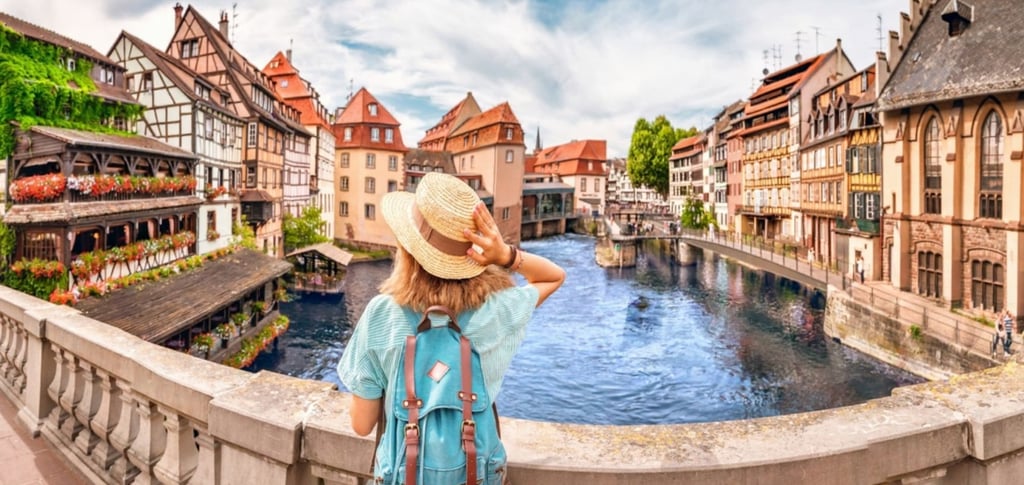French for Travelers: Essential Phrases and Tips for Visiting France
Learn essential French phrases for travelers visiting France. Tips for ordering food, asking directions, shopping, and enjoying your trip confidently.


Essential French Travel Phrases: Speak with Confidence on Your Trip to France
Introduction
Traveling to France is a dream for many — whether you’re strolling through Paris, exploring vineyards in Bordeaux, or relaxing on the French Riviera. While many people in tourist areas speak some English, learning a few essential French phrases can completely change your travel experience.
With just a handful of expressions, you’ll find it easier to order food, buy tickets, ask for directions, or simply connect with locals. Even if your pronunciation isn’t perfect, French people usually appreciate the effort, and your trip becomes smoother, more enjoyable, and more immersive.
1. Greetings and Polite Expressions
Politeness matters in France. Always greet shopkeepers, waiters, or strangers with a polite expression before asking for something.
Bonjour / Bonsoir – Good morning (Hello) / Good evening
Salut – Hi (informal, for friends)
Merci / Merci beaucoup – Thank you / Thank you very much
De rien – You’re welcome
S’il vous plaît – Please (formal)
Excusez-moi – Excuse me
Pardon – Sorry (used when bumping into someone)
Tip: In France, starting with Bonjour before asking a question is considered essential politeness. Skipping it can sometimes be seen as rude.
2. Asking for Directions
Navigating a new city is much easier when you know how to ask for help.
Où est… ? – Where is…?
Pouvez-vous m’aider ? – Can you help me?
C’est loin ? – Is it far?
À gauche / à droite – Left / right
Tout droit – Straight ahead
Près d’ici ? – Is it near here?
Example:
Excusez-moi, où est la station de métro la plus proche ?
(Excuse me, where is the nearest metro station?)
3. Ordering Food and Drinks
French dining culture is central to the travel experience. These phrases will make restaurants and cafés easier to navigate:
Je vais prendre… – I’ll have…
L’addition, s’il vous plaît – The bill, please
Un verre d’eau – A glass of water
Un café / Un thé – A coffee / A tea
Une bière / Un vin rouge / Un vin blanc – A beer / A red wine / A white wine
C’est délicieux ! – It’s delicious!
Example:
Je vais prendre une salade niçoise et un verre de vin blanc, s’il vous plaît.
(I’ll have a Niçoise salad and a glass of white wine, please.)
Tip: In France, you usually ask for “still water” (une carafe d’eau) if you want tap water with your meal.
4. Shopping and Transportation
Shopping in boutiques or navigating stations is easier with these phrases:
C’est combien ? – How much is it?
Je voudrais acheter… – I would like to buy…
Un billet pour Paris, s’il vous plaît. – A ticket to Paris, please.
Où est la gare ? – Where is the train station?
Un aller simple / Un aller-retour – A one-way / A return ticket
À l’aéroport, s’il vous plaît. – To the airport, please (to a taxi driver).
5. Hotels and Accommodation
Checking in and asking for services at hotels or Airbnbs:
J’ai une réservation au nom de… – I have a reservation under the name…
À quelle heure est le petit déjeuner ? – What time is breakfast?
Pouvez-vous appeler un taxi ? – Can you call a taxi?
Où est l’ascenseur ? – Where is the elevator?
6. Emergencies and Health
It’s always better to be prepared for unexpected situations:
Appelez la police ! – Call the police!
J’ai besoin d’un médecin. – I need a doctor.
Où est la pharmacie la plus proche ? – Where is the nearest pharmacy?
C’est une urgence. – It’s an emergency.
Je suis allergique à… – I’m allergic to…
7. Cultural Tips for Travelers
Speaking French isn’t only about words — it’s also about cultural awareness.
Always greet with “Bonjour” when entering shops or starting conversations.
Learn numbers, days of the week, and basic food vocabulary — you’ll use them daily.
Use formal “vous” with strangers or service staff; save tu for friends.
Don’t worry about making mistakes — effort counts more than perfection.
Smile! A friendly attitude goes a long way in France.
Conclusion
A few well-chosen French phrases can transform your trip to France. They help you navigate practical situations, connect with locals, and show respect for the culture.
You don’t need to be fluent to make a good impression. By practicing greetings, restaurant phrases, and basic travel vocabulary, you’ll not only survive but actually thrive during your trip. And who knows? These small steps may even inspire you to keep learning French long after your vacation ends.